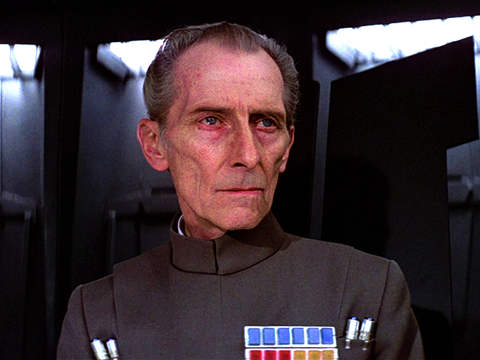
Image from Wikipedia
A while ago, I wrote a story about a future in which all actors are computer generated. In my story, advertisers acquire the rights to the likeness of Marlon Brando, which they subsequently use in an ad for an erectile disfunction pill, thus giving his most famous lines from The Godfather new meaning. For example: “Act like a man!”
I wrote this story thinking that it wouldn’t come true for another few decades, if ever. The funny thing is, it already happened.
If you’ve seen Star Wars: Rogue One, then you know that Grand Moff Tarkin makes an appearance. You also know that he looked a bit off in the film. That’s because Peter Cushing, the actor who pioneered the role in A New Hope, died over two decades ago. The Tarkin of the film is completely computer generated.
This is not the kind of thing Hollywood needs to be doing. Here’s why:
For starters, there was no legitimate reason to recreate this character through CGI (computer-generated imagery). Though he played a somewhat important role in the original Star Wars, it’s not like he was Luke Skywalker. Most casual Star Wars fans wouldn’t know him from Count Dooku.
Why not just recast the role? Any older, gaunt, severe British guy would’ve done the job. In fact, Charles Dance comes to mind as a perfect replacement (the dude who played Tywin Lannister on Game of Thrones). Filmgoers are smart enough to understand that two different actors can play the same role—especially if one of them passed away.
Furthermore, the current technology isn’t even good enough to completely achieve the effect they’re aiming for. The creators of Rogue One tried their damnedest, but human mannerisms are difficult to replicate. We’re all so familiar with human movements that any little deviation makes the whole illusion fall apart.
The Tarkin of Rogue One, for example, looks pretty darn real in still images. But when he walks and especially when he talks, he looks pretty darn artificial. (There’s another CGI cameo at the end that looks even worse, but I won’t spoil it for you.) I mean, come on. K-2SO looked more realistic than this dude.
And another thing: though the Cushing estate signed off on the film, what if Peter Cushing himself had hated it? What if he wouldn’t want to be involved at all? If this film is any indication for the future, studios don’t care. So long as the family agrees to the project (and gets a hefty check for doing so), then it doesn’t really matter what the actor would’ve wanted.
To illustrate, let’s imagine that Studio Whatever is producing their yearly superhero film. They’ve determined that these movies generally skew toward millennials and away from baby boomers. So, in order to increase their viewership among the older age group, they decide to cast Marilyn Monroe in the film.
Now we’ve got a celebrated cultural icon appearing in some stupid DC crossover movie directed by Zac Snyder. And by the way, she wouldn’t even be able to turn the project down, because she’s dead. It would be just as bad as it sounds.
I hope Hollywood considers what they’re doing before they decide to do more. Otherwise, they’re going to put Marlon Brando into an ad for erectile dysfunction. And I don’t think anyone wants to see that.

I had some similar thoughts when I watched rogue one. I wondered if they had paid a certain actress for rights to use her likeness.
Hmm I heard on a podcast that George Lucas bought the rights to that actress’s likeness a few decades ago. Maybe Disney acquired them with Lucasfilm?